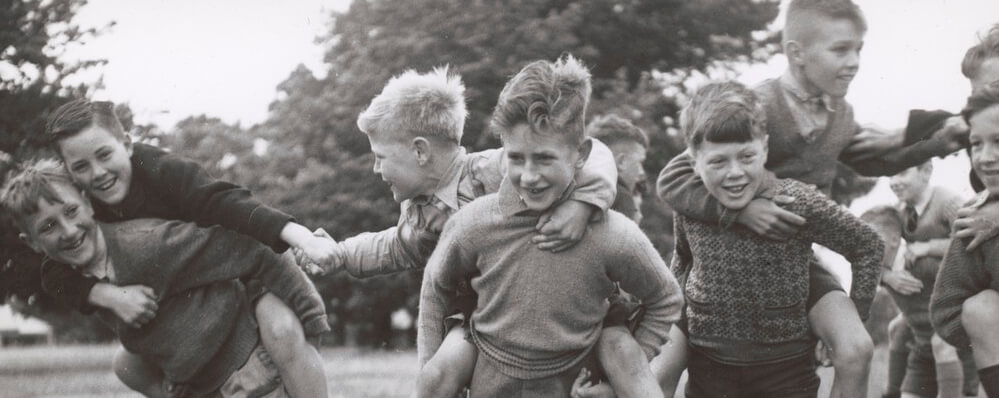Honoring Boyhood
Thoughts on the feminine culture of schools

“Now both sexes have melodies and rhythms which of necessity belong to them; and those of women are clearly enough indicated by their natural difference. The grand, and that which tends to courage, may be fairly called manly; but that which inclines to moderation and temperance, may be declared both in law and in ordinary speech to be the more womanly quality.” – Plato, Laws (Book VII)
In Plato’s Laws, while discussing education’s “two branches – one of gymnastic, which is concerned with the body, and the other of music, which is designed for the improvement of the soul,” an uncontested observation is made: that men and women possess a “natural difference,” a difference demonstrated in the “melodies and rhythms” that belong to them. Until very recent history, such an observation would require little to no clarification, backpedaling, or apologetic lines beginning with “Of course, we now know…” or “That’s not to say that…”
God created man, but when He saw the man by himself, He declared, “It is not good that the man should be alone; I will make him a helper fit for him” (Genesis 2:18). Before the Fall, only one thing was declared “not good”: man without woman. Together, they were complete. Together, they could “Be fruitful and multiply and fill the earth and subdue it and have dominion…” (Genesis 1:28).
All of this is intended simply to highlight the dignity, necessity, and difference of men and women. Men and women need one another and they need one another as men and women. And just as this is true in marriage and family life, it is true in the school.
Once upon a time, I was teaching medieval history to a group of high school students when there was a knock on my classroom door. I opened it to find a Kindergarten teacher and one of her students, a five-year-old boy, standing there. “Can Johnny (the name is always Johnny) sit in on your class for about five minutes?” I agreed, though with a bit of confusion, and welcomed Johnny to sit at my desk while I continued teaching. Several minutes later, his teacher returned to take him back to Kindergarten.
That afternoon, she explained that the boy had told her he felt that he was “supposed to be a girl.” Upon further questioning, she got to the bottom of the issue. Little Johnny wanted to be a teacher, but because he had never seen a male teacher, he concluded that he was the problem.
Schools are feminine environments, not just because of the high number of female teachers, but because of what schools require and honor. “Sit still. Be polite. Keep your hands to yourself. Don’t run. Raise your hand to talk. Walk in single file. Don’t throw that. No tackling.” These rules, often among numerous others, brush against the grain of boyhood. The rules are stacked against the boys.
That is not to say that boys do not need order. Indeed, they do. But, we must learn to distinguish between rightly training masculinity and squashing it altogether. For example, it is well and good that boys are taught to sit still when they need to, but that must be tempered with their desire to run, move, and climb which is also well and good. They must be allowed and encouraged to do both. Too frequently, schools honor sitting still and begrudgingly tolerate the movement, forgetting there is far more to evoke wonder outdoors than in all the textbooks combined.
Making adjustments to school culture always takes time, thought, and planning. There is no quick fix that would suddenly turn a conventional school into a boy-friendly environment. But, here are a few things to consider:
- Consider building in segregated times to the daily schedule. Allowing the boys to have recess or P.E. separate from the girls. This not only allows boys to play more aggressively, but may also give them opportunity to practice desirable masculinity. Anthony Esolen, in Out of the Ashes, notes, “Girls cannot know it except by report, but boys are actually kinder to one another when they are by themselves, even when they fight. When the girls are around, then they have to show off, they grow nervous and suspicious of one another, and they will try to win points with the girls by displays of dominance over their weaker fellows, a dominance that is not accompanied by grace, or by honoring the courage of a boy who lacks the stature and strength to win a fight, but by contempt and dismissal.”
- Involve men, especially the fathers of students, in the life of the school. Invite specific fathers to do presentations or teach skills. Have a father in landscaping teach students how to plant trees on the campus, or a father knowledgeable of construction help students build a greenhouse or raised bed garden.
- We get what we honor, so we must honor boys as boys. Our rules and the things we correct generally send the message that the traits of girlhood keep you out of trouble and make you a good student, while the traits of boyhood are the things that land you in the headmaster’s office. Look for opportunities to honor boyhood and give thought to what you correct, how you correct it, and why you correct it.

Brian Phillips
Dr. Brian Phillips serves as a pastor in Concord, NC, where he lives with his wife and their four children.










